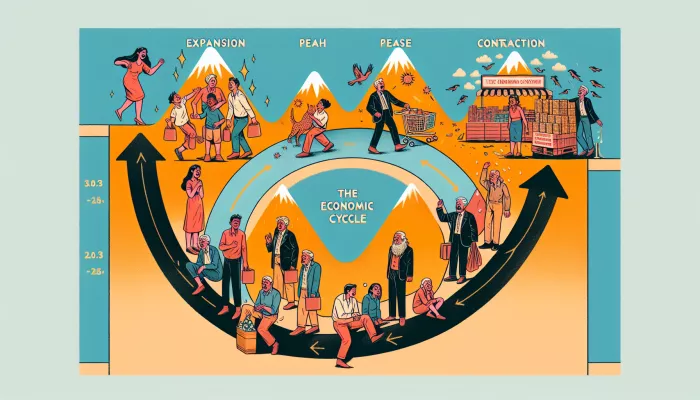

Economic cycles These are ups and downs that global economies go through over time.
Understanding these cycles is crucial for both economists and investors, as they affect every aspect of our lives, from employment to asset prices.
The phase of expansion is characterized by accelerated growth. During this stage, economic production, income and employment are on the rise.
Consumers feel confident to spend more, and companies invest in new projects and hires. It's the best of economic times.
At a certain point, the economy reaches its apex, which is the maximum moment of economic growth before it starts to slow down.
At this stage, interest rates may be raised to combat inflation, starting to affect the decision-making of consumers and companies.
A recession begins after the apex. It is a phase of contraction, where economic production decreases, unemployment increases, and consumer confidence falls.
During a recession, companies reduce investment and there may be job cuts. It is a challenging period for the economy.
Finally, there is the recovery, when the economy begins to recover from the low points of the recession.
Production and consumption slowly return to normal, jobs begin to reappear, and the economy as a whole begins a growth cycle again, preparing to enter the next phase of expansion.
Understanding these stages of economic cycles helps to predict sophistications in the job market, investment decisions, and political strategies.
By knowing each of these phases, we can make more informed decisions for our financial and personal benefit.
Understanding economic cycles is crucial for any investor who wants to maximize their returns and minimize risks.
Economic cycles, which include periods of expansion and contraction, directly influence all financial markets and, consequently, the value of investments.
Investors informed about the characteristics of economic cycles can anticipate changing trends in the markets, adjusting their portfolios to benefit from future market conditions.
This could mean selling assets before an expected recession or buying stocks that will appreciate during an expansion.
During different phases of the economic cycle, certain types of investments tend to perform better than others.
For example, investments in non-durable consumer goods and public services they often prove more resilient during economic contractions.
However, while investments in technology and discretionary consumption can thrive during an expansion.
With a solid understanding of economic cycles, investors can diversify your portfolios to include a balanced mix of assets sensitive and insensitive to economic cycles.
What's more, this strategy reduces portfolio risk over time, ensuring more stable performance regardless of economic conditions.
Knowledge about economic cycles provides a solid basis for decision making of investments.
By correctly assessing where the current economic cycle is positioned, investors can better adjust their return expectations and risks associated with their investments.
Conclude with a motivational phrase:
The path to investment success necessarily involves understanding economic cycles.
Investors who master this knowledge are better equipped to navigate the complexities of the market and make more obvious choices.
Each phase of the economic cycle, be it expansion, peak, recession or recovery, has a direct and tangible impact about everyday life.
These cycles reflect variations in economic activity that can affect everything from employment to consumer financing capabilities.
In periods of economic expansion, Companies often see growth in profits, which can lead to an increase in the number of jobs available and, in turn, higher wages.
Conversely, during recessions, unemployment tends to rise as companies cut costs, which can result in a drop in household income and increased job insecurity.
Economic health also directly affects purchasing power. During inflation, the prices of products and services increase, and your money can buy less.
However, in times of deflation, when prices fall, your purchasing power increases. Understanding how economic cycles influence inflation can help families better plan their spending.
The economic environment influences tightly the ease with which individuals and companies can access credit.
In times of economic prosperity, banks tend to lend more, as confidence in the ability to repay loans is greater.
During recessions, however, credit can become scarce as financial institutions become more cautious about granting loans.
The economic cycles directly and significantly influence investment performance.
In times of growth, stock markets generally prosper, while during recessions, investors may seek safety in more conservative options.
That is, government bonds or savings accounts, which tend to offer lower but safer returns.
Still, the economic situation of a country affects the real estate market in many ways.
For example, low interest rates can encourage home purchases as mortgage loans become more affordable.
During a recession, however, people may delay home purchases due to economic uncertainty or decreased purchasing power.
To understand How economic cycles impact everyday life is fundamental to to plan and make decisions financial with greater safety and effectiveness.
As well as paying attention to economic trends, individuals can adjust their savings, investment and spending strategies, aiming for long-term financial stability.